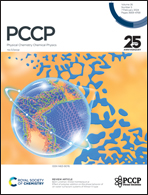Applications of noisy quantum computing and quantum error mitigation to “adamantaneland”: a benchmarking study for quantum chemistry†
Abstract
The field of quantum computing has the potential to transform quantum chemistry. The variational quantum eigensolver (VQE) algorithm has allowed quantum computing to be applied to chemical problems in the noisy intermediate-scale quantum (NISQ) era. Applications of VQE have generally focused on predicting absolute energies instead of chemical properties that are relative energy differences and that are most interesting to chemists studying a chemical problem. We address this shortcoming by constructing a molecular benchmark data set in this work containing isomers of C10H16 and carbocationic rearrangements of C10H15+, calculated at a high-level of theory. Using the data set, we compared noiseless VQE simulations to conventionally performed density functional and wavefunction theory-based methods to understand the quality of results. We also investigated the effectiveness of a quantum state tomography-based error mitigation technique in applications of VQE under noise (simulated and real). Our findings reveal that the use of quantum error mitigation is crucial in the NISQ era and advantageous to yield almost noiseless quality results.



 Please wait while we load your content...
Please wait while we load your content...